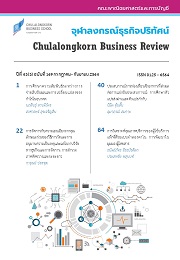Analysis of Service Quality of Taxi Passengers through Kano Model: Developing from Customer’s Perspective
Main Article Content
Abstract
Over the years, Thai taxi passengers have been confronted with the problems of taxi service quality. Furthermore, current taxi passenger behavior has changed, so researchers are interested in studying and improving the quality of taxi service from the perspective of passengers. This survey research aims to study attributes of service quality which come from taxi passenger’ s perspective in Bangkok and the vicinity area. The sample group of this research is 495 taxi passengers selected by convenience sampling technique. This research instrument was an online questionnaire of Kano model concept. The data was analyzed by percentage, Kano model and analytical Kano model.
The findings reveal that the crucial attributes of taxi service quality to be aware of, namely 1) attractive attributes are the warning system when the taxi is off-route and taxi safety during the COVID-19 situation. 2) the 15 one-dimensional attributes with the top three customer satisfaction indices regarding drivers obey traffic rules, validation of the driver's identification card, and taxi condition. As for the 10 indifferent attributes, there are no effects on the taxi passenger behavior. However, the result of this research could be used for stakeholders as a guideline to develop better taxi service quality for creating sustainable growth of the taxi business.
Article Details
Opinions and discussions in papers published by the Creative Business and Sustainability Journal (CBSJ) are deemed as personal opinions and the responsibility of the writers. They are not the opinions or responsibility of the Chulalongkorn Business School of Chulalongkorn University.
Papers, content, information etc. appearing in the Journal are deemed to be the copyright property of the Chulalongkorn Business School of Chulalongkorn University. Anybody or any organization that wishes to publish any part of them or use them in any way must obtain written permission from the Chulalongkorn Business School, Chulalongkorn University.


